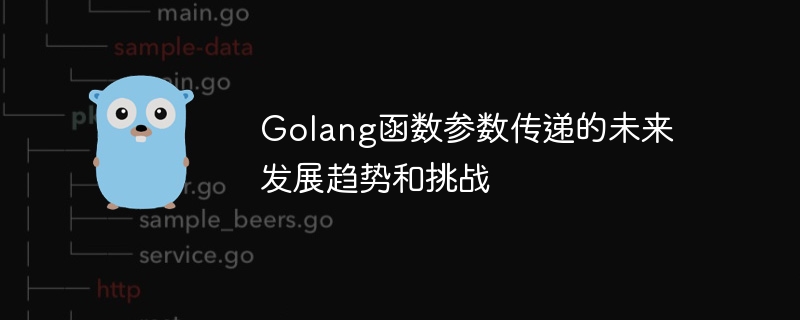 Backend Development
Backend Development
 Golang
Golang
 Future development trends and challenges of Golang function parameter passing
Future development trends and challenges of Golang function parameter passing
Future development trends and challenges of Golang function parameter passing
Apr 13, 2024 pm 04:39 PMThe future development trend of Go function parameter passing includes universal type parameters, coroutine parameters and optional parameters. These trends pose challenges to abstraction, concurrency safety, and backward compatibility. The pass-by-value and pass-by-reference mechanisms enable developers to control the semantics of parameter passing, such as using pass-by-reference to modify parameter values by modifying the pointer target value.

Future development trends and challenges of function parameter passing in Go
The function parameter passing mechanism of Go language continues to evolve with the evolution of the language Improvement brings new features and challenges. This article will explore the future development trends and challenges of Go function parameter passing.
Evolution of the passing mechanism
Go function parameters initially adopted a pass-by-value mechanism, which means that a copy of the value is passed when the function is called. As the language evolved, Go introduced pointer types passed by reference. In addition, Go 1.18 introduces a new way of passing interface types, namely passing the interface value directly.
Future Trend
The future development trend of Go function parameter passing includes:
- Universal type parameters: Allows functions to accept parameters of any underlying type, improving code reusability.
- Coroutine parameters: Supports passing coroutines as function parameters, which enhances concurrent programming capabilities.
- Optional parameters: Provides a mechanism to declare optional function parameters to improve code flexibility.
- Parameter covariance and contravariance: Allows a function to accept or return a type derived from its declared type.
Challenges
These future trends also bring challenges:
- Abstraction and efficiency: The implementation of generic type parameters can involve a lot of abstraction, which can impact performance.
- Concurrency security: Concurrency security issues need to be considered when passing coroutine parameters, and concurrent access to data must be handled carefully.
- Backward compatibility: New features need to consider compatibility with old code.
Practical case
Consider the following Go function that modifies parameter values by passing a pointer by reference:
func incrementPointer(p *int) {
*p++
}
func main() {
x := 10
incrementPointer(&x)
fmt.Println(x) // 输出:11
}Pass by reference via modification The target value of the pointer is modified. If you want to use pass-by-value without modifying the parameter value, you need to copy the parameter:
func incrementCopy(x int) {
x++
}
func main() {
x := 10
incrementCopy(x)
fmt.Println(x) // 输出:10
}Conclusion
Go The future trend of function parameter passing brings new features and challenges. Understanding these trends is critical to writing efficient, flexible, and concurrency-safe Go code.
The above is the detailed content of Future development trends and challenges of Golang function parameter passing. For more information, please follow other related articles on the PHP Chinese website!

Hot Article

Hot tools Tags

Hot Article

Hot Article Tags

Notepad++7.3.1
Easy-to-use and free code editor

SublimeText3 Chinese version
Chinese version, very easy to use

Zend Studio 13.0.1
Powerful PHP integrated development environment

Dreamweaver CS6
Visual web development tools

SublimeText3 Mac version
God-level code editing software (SublimeText3)

Hot Topics
 How to safely read and write files using Golang?
Jun 06, 2024 pm 05:14 PM
How to safely read and write files using Golang?
Jun 06, 2024 pm 05:14 PM
How to safely read and write files using Golang?
 How to configure connection pool for Golang database connection?
Jun 06, 2024 am 11:21 AM
How to configure connection pool for Golang database connection?
Jun 06, 2024 am 11:21 AM
How to configure connection pool for Golang database connection?
 Similarities and Differences between Golang and C++
Jun 05, 2024 pm 06:12 PM
Similarities and Differences between Golang and C++
Jun 05, 2024 pm 06:12 PM
Similarities and Differences between Golang and C++
 How steep is the learning curve of golang framework architecture?
Jun 05, 2024 pm 06:59 PM
How steep is the learning curve of golang framework architecture?
Jun 05, 2024 pm 06:59 PM
How steep is the learning curve of golang framework architecture?
 How to solve the problem of busy servers for deepseek
Mar 12, 2025 pm 01:39 PM
How to solve the problem of busy servers for deepseek
Mar 12, 2025 pm 01:39 PM
How to solve the problem of busy servers for deepseek
 How to generate random elements from list in Golang?
Jun 05, 2024 pm 04:28 PM
How to generate random elements from list in Golang?
Jun 05, 2024 pm 04:28 PM
How to generate random elements from list in Golang?
 Comparison of advantages and disadvantages of golang framework
Jun 05, 2024 pm 09:32 PM
Comparison of advantages and disadvantages of golang framework
Jun 05, 2024 pm 09:32 PM
Comparison of advantages and disadvantages of golang framework
 What are the best practices for error handling in Golang framework?
Jun 05, 2024 pm 10:39 PM
What are the best practices for error handling in Golang framework?
Jun 05, 2024 pm 10:39 PM
What are the best practices for error handling in Golang framework?






